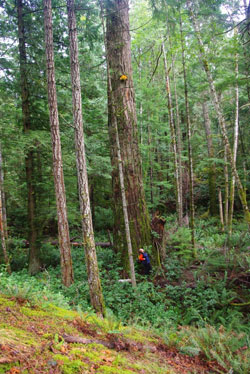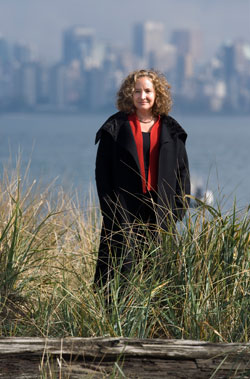
“It’s hard to imagine us ever running out of trees.”
So said a former employer to me, many years ago. He had traveled extensively throughout British Columbia, and was commenting on the magnificently abundant nature across the province. We were discussing the importance of natural resources to BC’s economy—and more to the point, our industrial capacity to remove entire forests, vast swaths of wilderness that might never be seen again. He simply couldn’t imagine that might be possible.
Yet in recent years, we’ve witnessed pine beetles’ infestation of our central forests, massive variations in annual salmon returns on BC’s coasts, and wildfires that have razed both mountainsides and neighbourhoods. In the context of a changing climate, it is well within the realm of imagining that some of these priceless landscapes may be damaged or lost forever. The abundance of our natural environment is all too easy to take for granted.
It is in this very context, and in recognition for her determined and strategic approach to mitigating these risks,that Carol Newell is being honoured with the Real Estate Foundation of BC’s 2013 Land Champion Award.
I was very much looking forward to speaking with Carol about this recognition, and about her work. I spoke to Carol at her Cortes Island home, calling her from a hotel room in Baltimore, where urban renewal has honoured the history of place, while looking ahead to a sustainable architectural future.
To connect with Carol Newell is to migrate into a land of profound metaphor, where biodiversity is the model for resilient economics, and the natural cycles of flourish and decay are the models for the generative flow of capital. For Carol, the “grand diversity and generosity” of nature is something not to be mastered, but to be emulated: “Mother Nature has figured out economics in a way that works.”
 It’s easy for us to ignore that natural harmony, when we take nature’s abundance for granted. “It can create a throwaway society—because there’s seemingly always more to take,” Carol said. “How do we become craftily efficient with the resources, making the very best use of them—always from the long term perspective, avoiding senseless waste, with time and space for their renewal?”
It’s easy for us to ignore that natural harmony, when we take nature’s abundance for granted. “It can create a throwaway society—because there’s seemingly always more to take,” Carol said. “How do we become craftily efficient with the resources, making the very best use of them—always from the long term perspective, avoiding senseless waste, with time and space for their renewal?”
Carol’s philosophy, along with her quiet wisdom, attentive presence, and deep, studied expertise, led her to work on diverse conservation projects throughout BC. The Tatshenshini wilderness. The Great Bear Rainforest. And her beloved Cortes Island, where she first settled about five years after moving to BC’s coast. Carol and her colleagues integrated a regional focus with philanthropy and strategic investment, and the results of their work have succeeded beyond their imagining.
It all began with a simple realization: Carol had more financial resources than she needed. Heiress to a significant financial fortune, Carol had become determined to use her “discretionary capital” (a compelling play on “discretionary income”) to redress the root causes of rapidly compounding environmental challenges.
“Along with that privilege came what I began to see as a responsibility,” Carol explained. “Who else can take risks, if not those who have major capital reserves?”
For over a decade, Carol remained the anonymous financier behind Endswell Foundation and Renewal Partners, aiming across a portfolio of grants and investments to demonstrate “another way to behave with money.” Rather than getting caught up in the growth economy, Carol and her allies focused on serving the common good. Rather than locking in and accumulating financial wealth, they worked to release it, “flowing money out to the people doing really good work.” Carol began to see philanthropy and investment as the same: “They’re both investments in the future. It was really all about putting capital to work to animate our mission.”
And that mission was both profound and ambitious: To demonstrate in a defined geographic region that a focus on abundance, resilience, and harmony with nature could deliver environmental, social and financial returns.
The multiplier effect of this release of capital flows has been profound: “Ms. Newell’s innovative approach to philanthropy and investment has provided BC residents with a lasting legacy through her work in conserving land of high ecological, cultural and recreational value,” said Jack Wong, CEO of the Real Estate Foundation of BC.
 Carol is quick to shine the light on those around her—indeed, it was her first instinct when we began our conversation. “It’s easy to focus on the philanthropist, but so many others do the work.” She mentions Joel Solomon, her long-time ally and strategist; Martha Burton, papering all the deals for years; the hundreds of dedicated environmentalists and professionals who have focused time, energy, intellect and passion on the diverse range of projects Endswell supported over the years; and the “people on the land”—whether the traditional peoples of what is now British Columbia, or those who have arrived more recently. “Our aim was as often as possible to seek out good work that was already going on, getting in and supporting it.”
Carol is quick to shine the light on those around her—indeed, it was her first instinct when we began our conversation. “It’s easy to focus on the philanthropist, but so many others do the work.” She mentions Joel Solomon, her long-time ally and strategist; Martha Burton, papering all the deals for years; the hundreds of dedicated environmentalists and professionals who have focused time, energy, intellect and passion on the diverse range of projects Endswell supported over the years; and the “people on the land”—whether the traditional peoples of what is now British Columbia, or those who have arrived more recently. “Our aim was as often as possible to seek out good work that was already going on, getting in and supporting it.”
A few years after abandoning her anonymity, Carol remains both curious and concerned about how the economic system might be shifted” to become more generative. “How can we become better allies to nature, so our relationship is symbiotic—mutually beneficial?” she asks. “How can human beings learn to live with nature—rather than in defiance of nature, or keeping it at bay, or overtaking it?” She continues to worry that humanity has pushed nature too far already, but when asked what gives her hope for the future, Carol has no shortage of reasons to be optimistic.
People are “geared to work our way through extreme situations, building our ‘ingenuity chops,” she says. “As we head toward mounting crises, we’ll actually figure out that it’s important to deal with them. We’ll step into that. Hopefully sooner than later!”
Today, Carol’s increasingly interested in the historical notion of the commons—assets that are protected and preserved for the mutual benefit of everyone in society, and more broadly for their own sake as essential natural elements and spaces. Soil. Water. Air. These are things we should share, and find ways to support.
“These assets are the ‘real world.’ That’s why it’s so important to find ways to live in harmony with nature. Nature is our context. If nature doesn’t make it, we don’t make it. We need an economy whose very function regenerates and renews it.”
Educating and guiding investment smarts with philanthropic and generative intent may be a start. Redefining expectations for more balanced rates of return is another important consideration. Finding ways to bridge people and deep nature is essential, along with a good dose of gratitude and awareness for all that nature does for us for free. “Now those are better than average returns!”
As we hang up from our call, and I look out across Baltimore’s sunny inner harbour, I feel hopeful that wisdom will prevail, and that generous leadership like Carol’s will help us find solutions to some of humanity’s most vexing challenges.
Mike Rowlands is a Principal at Junxion Strategy, an advisor to the Real Estate Foundation of BC, and has recently come to know and admire Carol Newell. He grew up playing on the “town common” in a small town in England, where he learned the immeasurable value and joy of living in harmony with nature.
SHARE